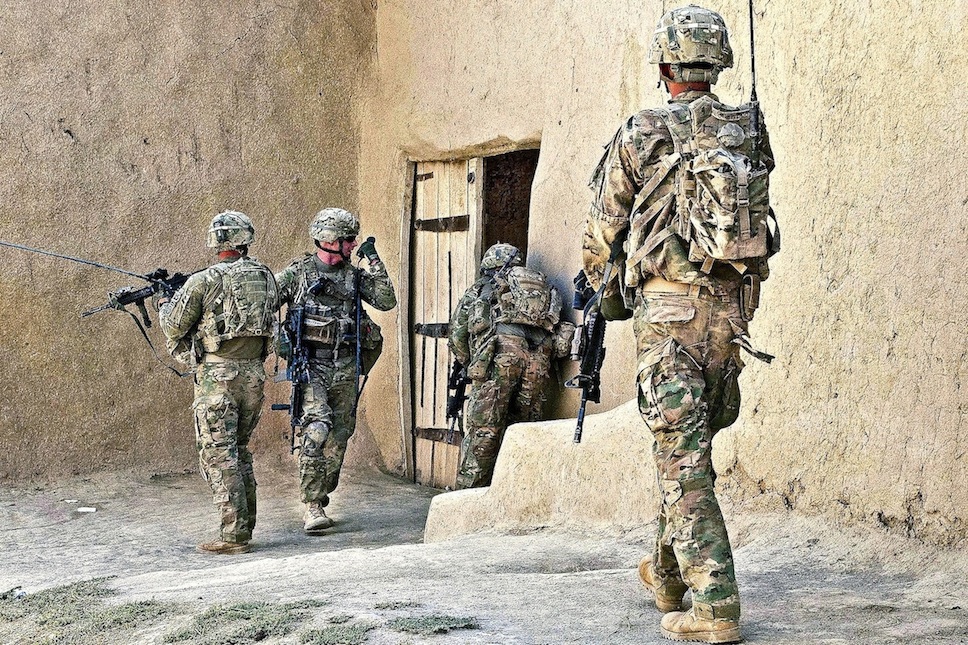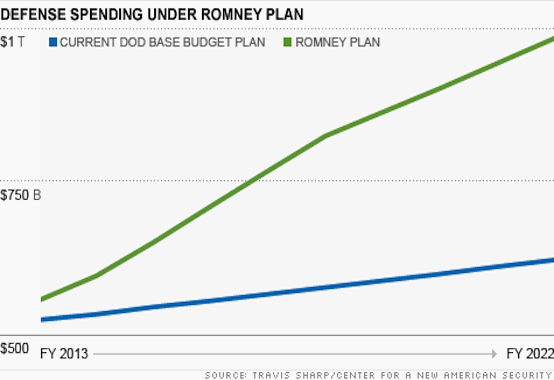John Glaser, AntiWar.com speaks at Duke University from CineFilm Media on Vimeo.
Month: October 2012
Antiwar.com Newsletter | October 5, 2012
Antiwar.com Newsletter
| October 5, 2012
IN THIS ISSUE
- Top News
- Opinion and analysis
This week’s top news:
Robert Gates: War on Iran Would Be ‘Catastrophic,’ Make Tehran Nukes ‘Inevitable’: Neither the United States nor Israel is capable of wiping out Iran’s nuclear capability, former defense secretary Robert Gates said, and "such an attack would make a nuclear-armed Iran inevitable. They would just bury the program deeper and make it more covert."
Romney, ‘Deficit Hawk,’ Will Explode Military Spending
Mitt Romney “won” the debate the other night by doing what he has always done: altering his views to fit whatever situation he is in. Much of the media and the public were apparently drawn to Romney’s slick rhetoric that made him appear ready to make deep cuts in America’s mind-boggling deficit. But that math doesn’t add up. He promises tax cuts; surely they’ll stay at approximately the rates they are now. He promises to cut government spending; again, not reliable. But he also promises – promises – to increase military spending by $2 trillion dollars over 10 years. Somehow, this is one promise I believe he’ll stick to.
CNN crunched the numbers and offered this graph (via Jack Hunter):
Romney is eager to increase US defense spending – which already equals that of the rest of the world combined – by leaps and bounds. Leaving aside what a proven liar Romney is, and how unlikely his other deficit-reduction promises are, this graph alone should stop Republicans, Democrats, or any Americans from ever saying he’s a deficit hawk.
Afghans Love Being Occupied
Hey, did you know Afghans are killing US soldiers because they so desperately want us to continue occupying their country?
That is the rather absurd argument in a piece run by Foreign Policy by Felisa “Farzana” Dyrud, a former US Air Force officer. Dyrud says that, contrary to most commentary, the reason we’ve seen such a spike in “insider attacks” is because we’ve announced that we’re  withdrawing in 2014. The attacks, she argues, are “a symptom of the trust crisis between the Afghan National Security Forces (ANSF) and the International Security Assistance Force (ISAF), stemming from the US announcement of its withdrawal by the end of 2014 — regardless of mission completion.” She says “hundreds” of surveys and “conversations with Afghans” support this conclusion, although she offers not one of these in her article.
withdrawing in 2014. The attacks, she argues, are “a symptom of the trust crisis between the Afghan National Security Forces (ANSF) and the International Security Assistance Force (ISAF), stemming from the US announcement of its withdrawal by the end of 2014 — regardless of mission completion.” She says “hundreds” of surveys and “conversations with Afghans” support this conclusion, although she offers not one of these in her article.
You see, “Afghans do not resent Americans for being occupiers,” Dyrud obliviously insists, “but rather for leaving the job unfinished.”
First of all, the general consensus is that the Taliban have a lot to do with these insider attacks. When the US first had Kabul seek out and arrest those within the US-trained Afghan security forces that may have ties to the Taliban, the Defense Ministry said, “Hundreds were sacked or detained after showing links with insurgents.” And in August it was reported that the Taliban’s supreme leader Mullah Omar issued a statement bragging about extensive insurgent infiltration in America’s trained security personnel in Afghanistan. “They are able to (safely) enter bases, offices and intelligence centers of the enemy,” he said. “Then, they easily carry out decisive and coordinated attacks, inflicting heavy losses on the enemy.”
As a former US official told Dexter Filkins of the New Yorker, “several hundred soldiers in the Afghan Army are thought to be agents for the Taliban or for Pakistan.” He said that many insurgents who have infiltrated the Afghan forces and killed US troops “had been planted in the Army by the Taliban or by Inter-Services Intelligence, Pakistan’s main intelligence branch.”
 So while some of these insider attacks have been reported to be committed by Afghans in the security forces that don’t have ties to the insurgency, a great bulk of them are exactly that. It is a Taliban strategy. So, if Dyrud’s argument is correct, and these attacks are really based on an understanding in Afghanistan that the US is leaving, why wouldn’t the Taliban just sit back and let it happen? Why would they waste more recruits on these insider attacks?
So while some of these insider attacks have been reported to be committed by Afghans in the security forces that don’t have ties to the insurgency, a great bulk of them are exactly that. It is a Taliban strategy. So, if Dyrud’s argument is correct, and these attacks are really based on an understanding in Afghanistan that the US is leaving, why wouldn’t the Taliban just sit back and let it happen? Why would they waste more recruits on these insider attacks?
Dyrud’s fundamental claim, though, is that ordinary Afghans are attacking American soldiers, because they’re upset that America is leaving. First, it’s hard to believe the Afghan people are displeased that their country will no longer be militarily occupied, their people will no longer be murdered in cold blood, that their homes will no longer be raided on a daily basis, and their government will no longer be the corrupt puppet of a far off land they hardly know about. But let’s entertain for a moment that these Afghans are attacking Americans because they are wishing they’d stick around longer. What makes them think such attacks will produce improved relations that will then cause Americans to stay? If Afghan in the security forces are desperate to have us stay, wouldn’t they be doing something other than killing us?
It doesn’t add up. Arguments against ending the war, or against announcing a withdrawal date, all contain this Orwellian twaddle. The occupied are being liberated. The oppressed are enjoying themselves. The aggrieved are just sad the warriors are leaving.
Costs of War on Iran: A Systematic Disregard for Human Life
There is something of a consensus forming around the conclusion that a preventive US and/or Israeli attack on Iran (for a nuclear weapons program it doesn’t have) is the wrong thing to do. Last night former Defense Secretary Robert Gates spoke at an event warning “the results of an American or Israeli military strike on Iran could, in my view, prove catastrophic.” He said “such an attack would make a nuclear-armed Iran inevitable,” disrupt world oil traffic in the Persian Gulf, and prompt a wave of terrorism across the region, “haunting us for generations in that part of the world.”
 It’s notable enough that a veteran of the Washington military and intelligence establishment like Gates speaks this publicly and vociferously against a war on Iran. But he’s not alone. A report released last month by former government officials, national security experts and retired military officers concluded also that an attack would motivate Iran to restart its weapons development, and that the ensuing war would end up being “more taxing than the Iraq and Afghanistan wars combined.”
It’s notable enough that a veteran of the Washington military and intelligence establishment like Gates speaks this publicly and vociferously against a war on Iran. But he’s not alone. A report released last month by former government officials, national security experts and retired military officers concluded also that an attack would motivate Iran to restart its weapons development, and that the ensuing war would end up being “more taxing than the Iraq and Afghanistan wars combined.”
The Obama administration too – terrible as their economic sanctions and militaristic postures are towards Iran – has been adamantly against going to war, at least right now. America’s top military official, Chairman of the Joint Chiefs Gen. Martin Dempsey, reiterated last month that the US would not be “complicit” in an Israeli strike, which he also explained would be counterproductive. Israeli press reports came out around the same time claiming the Obama administration sent a surreptitious message to Iran promising not to back an Israeli strike, as long as Tehran refrains from attacking American assets in the Persian Gulf.
Even leading figures in Washington who reliably monger for war and regime change in the Middle East, have quieted their battle trumpets as of late, subdued from the fever pitch they reached a matter of months ago. It is clear that the tactical, strategic, and financial costs of a discretionary war on Iran have turned the tide against war (again, at least for now).
In all of the massive commentary in establishment foreign policy circles that has come out on the Iran issue as of late, however, very little focuses on the immense human costs a war on Iran would entail. According to a new report that tries to estimate this, the number of immediate casualties that would result from bombing Iran’s top four enrichment sites would be would be about 5,000 people. “If the bombing would include more than those four sites,” says the study from the University of Utah’s Hinckley Institute of Politics, “then the immediate casualty would be up to 10,000 people.”
 What about casualties that are not immediate? Even if a US or Israeli strike only targeted Iran’s nuclear sites and it didn’t result in larger land war (unlikely), the toxic plumes released as a result of the strikes could kill or injure up to 70,000 civilians in nearby cities and towns. “People’s skin could be burnt, they could become blind, their lungs could be destroyed, their kidneys could be damaged, and in the future they could face other health problems such as skin cancer and [other forms] of cancer,” according to the author of the report.
What about casualties that are not immediate? Even if a US or Israeli strike only targeted Iran’s nuclear sites and it didn’t result in larger land war (unlikely), the toxic plumes released as a result of the strikes could kill or injure up to 70,000 civilians in nearby cities and towns. “People’s skin could be burnt, they could become blind, their lungs could be destroyed, their kidneys could be damaged, and in the future they could face other health problems such as skin cancer and [other forms] of cancer,” according to the author of the report.
According to a 2009 study by the Center for International and Strategic Studies “any strike on the Bushehr nuclear reactor will cause the immediate death of thousands of people living in or adjacent to the site, and thousands of subsequent cancer deaths or even up to hundreds of thousands depending on the population density along the contamination plume.” Even civilians in neighboring countries would be effected: “Bahrain, Qatar and the United Arab Emirates will be heavily affected by the radionuclides.”
The casualty estimates go much higher when the aftermath, or retaliation, to the aggressors’ strikes is taken into consideration. A declassified war simulation run by the Pentagon earlier this year forecasted that the “wider regional war” and Iranian retaliation that would likely result from an attack would immediately get at least 200 Americans deployed in the region killed. The RAND Corp. thinks that Iran would also turn to unconventional military tactics – they call it “terrorism” – in response, which would put even more innocent lives at risk. Almost every official estimate – and common sense, considering America’s recent experiences in Iraq – concludes that an all out war in Iran would result in a strong insurgency and possible a descent into civil war, which has the potential to kill hundreds of thousands.
This has not been a commonly cited reason for avoiding an unnecessary war with Iran. It’s encouraging that so much of official Washington is decidedly against war for the tactical and strategic costs, but these human costs are systematically overlooked in the vast majority of the analysis. It’s what John Tirman, professor at MIT, calls “collective autism” about the costs of war. Americans who are either supportive or ambivalent about war on Iran – or for that matter Iraq, Afghanistan, and beyond – are like all people suffering from the delusions of nationalism. When it’s the other guy being bludgeoned, they can’t summon the regard they’d have for hundreds of thousands of Americans being killed because an international bully attacked us without provocation.
How the Two Parties Control the Presidential Debates, Marginalize Dissent
George Farah, founder and executive director of Open Debates, tells Democracy Now that the two parties impose rules on the debates “to control various components of the debates to eliminate both third party candidates, unpredictable questions, and any threat to their dominance in our political process.”




